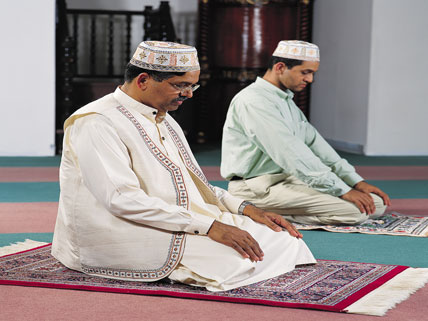Two Muslim men at prayer
A smoldering feud has erupted again and now threatens to spread uncontained violence across the Middle East. It’s not the Arab-Israeli dispute, though that more-recent conflict remains unresolved. Rather, it is a conflict internal to Islam—between Sunnis and Shias (or Shiites). The Sunni-Shia split has reignited in Syria. On one side is the Assad regime, whose supporters are Alawites (a Shiite subsect) backed by other Shia Muslims including the forces of Hezbollah from Lebanon with funding by Iran, the country in the region with the largest Shiite population. On the other side is Syria’s majority-Sunni population, which mostly supports the rebels in the civil war. The Sunni side is receiving military aid from Saudi Arabia and has attracted Sunni jihadist fighters from Iraq and elsewhere.
In recent months, sectarian violence in Iraq has been on the rise. In 2003 the United States overthrew the regime of Iraqi dictator Saddam Hussein, whose chief support came from Iraq’s Sunni minority. Iraq’s new government came to be dominated by the majority Shias, and in 2006, during the continuing Iraq War, the country teetered on the verge of a civil war between Shiite and Sunni militias. The U.S. “surge” of troops in 2007 helped put a lid on the violence, but in the time since the U.S. pullout in late 2011, it has increased. Now the situation in Iraq shows signs of spiraling out of control.
To many observers, what is most troubling is that the fault lines of the Sunni-Shia conflict lie within many other countries in the region. Several majority-Sunni nations have large Shiite minorities that might become inflamed by the Syrian conflict and launch their own rebellions. Such an escalation could threaten Bahrain, Yemen, and Kuwait.
Image credit: © Houghton Mifflin Harcourt
Related Links
- The Sunni-Shiite War
This article looks at the potential for ongoing sectarian conflicts in Syria and Iraq to erupt into a wider Sunni-versus-Shiite war in the Middle East; it also provides historical context.
(Source: The Week, October 26, 2013) - Many Sunnis and Shias Worry about Religious Conflict
Explore the findings of the Pew Research Center’s Religion & Public Life Project on what present-day Muslims on both sides of the Sunni–Shia divide think and feel about their age-old differences; includes numerous graphs and a map showing the relative populations in various Muslim-majority countries.
(Source: Pewforum.org, November 7, 2013) - Religion Facts: Comparison of Sunni and Shia Islam
This Web site, which purports to be an objective guide to religion and religious viewpoints, compares the two major sects of Islam: Sunni and Shia.
(Religionfacts.com: accessed November 20, 2013) - The Origins of the Shia-Sunni Split
This radio report (the first of a series), which originally aired during the height of sectarian violence during the Iraq War, does an excellent job of characterizing the historic split among Muslims; the site includes images and maps.
(Source: NPR.org, February 12, 2007)





They have weird hats
because there white
You shouldn’t comment on the religions of others. They might think you look funny. No Xbox for 2 years and the
why are they white
don’t nobody want your opinion either :>{
ha
stop being racist people actually dress and look like how these people look learn something and stop being haters
yes he is right
I know this was not Bush’s intention but a dievdid Muslim world works to our favor. As long as they are fighting one another, they will not have the strength to take on the western world including the United States. Our only national interests in that region are 1) stable supply of oil; amd 2) preventing terrorism against U.S. targets. It is all about stabiliy which is why the Bush war policies have been such a universally acknowledged disaster.
guys stop really
stop be nice guys